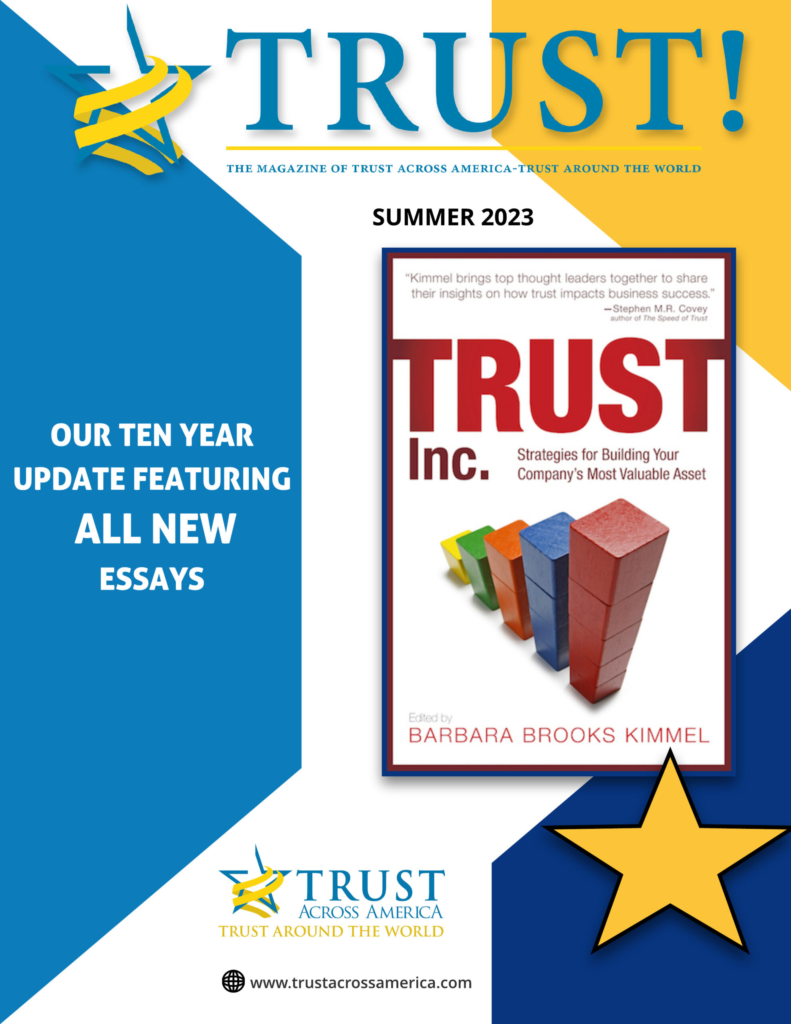
Did you ever buy a product from a company you didn’t trust? The decision sits in the craw of your throat. Uncomfortable, but perhaps without a choice, the process moves forward with the hope that you will be proven wrong, and everything will be okay this time. But unfortunately, your instincts are usually proven right. After all, there is a reason why a company hasn’t achieved trust with you. They are not trustworthy.
Trustworthiness is a vital component of every corporate interaction. It is the lubrication of commerce. Without trust in the organization, the company will ultimately cease functioning effectively or efficiently.
Building trust between the company and its customers starts with the CEO. Still, it is also the responsibility of every individual in the company where contact is made with the consuming public. Trust takes time to build but can be lost instantly if communication isn’t sincere or the intention isn’t authentic. Trust is vital to the health and vitality of the corporation, and it needs to be embedded in the company’s DNA.
Consciously think about your interactions with the products or services you purchase daily. For example, consider your level of trust at the point of sale when you offer your credit card to complete the transaction. Not every purchase will be made with 100% confidence in the company and ask yourself what they might do differently to gain your trust. That kind of critical thinking and planning puts companies on the path of utilizing trust to build it into a valuable intangible asset that can be measured and managed for value creation.
Will management invest in building a trustworthy organization?
Trust is an intangible quality that exists between individuals. Trustworthiness is organizational trust, which is an intangible asset of the company. Trustworthy companies, in my opinion, will benefit from higher revenue and a greater cash flow multiple (premium investors are willing to pay for a share of stock) than peer companies with lower trust scores. This belief is based on thirty years of proprietary quantitative research called the Corporate Branding Index® (CBI), which found that individuals like to buy from and invest in companies they deem familiar and favorable.
The research conducted in the CBI examined descriptive attributes quantitatively and longitudinally over time among an audience of impartial observers. This study included thousands of interviews conducted annually among hundreds of companies, which created a rock-solid benchmark for evaluating how intangible assets impacted the corporate brand and financial performance of the firm, including the stock price. In addition, corporations utilized the study to understand how business decisions affect the corporate brand and, ultimately, the company’s long-term financial performance.
The attributes measured in the CBI included overall reputation, perceptions of management, investment potential, and a culture of innovation. When measured together, these attributes were utilized to predict financial performance when all other financials are held constant. In addition, the models were proven effective for decision-making and examining “what if” questions of importance to the CEO and board of directors.
Is trust measurable and manageable?
Barbara Brooks Kimmel, CEO of Trust Across America, has developed a consistent way of measuring trustworthiness that is consistent, independent, longitudinal, and reliable. These are the elements required in building independent variables when valuing intangible assets.
Trustworthiness as an intangible asset that can be managed and measured for value creation. Trustworthiness is a collective perception of an entity from the perspective of every audience that is important to the entity. Key audiences include employees, customers, investors, media, and local communities. While the research methodology between the CBI and Trust Across America differs, the overall concept and top line findings run parallel. As a result, I believe trustworthiness is a powerful intangible asset that significantly impacts the company’s brand and, ultimately, its financial performance.
Trust is the most vital intangible asset of any personal or business relationship. Trust is a primary component of every interaction, quietly influencing and persuading every decision. Trust is a delicate but persuasive intangible that can sway important and valuable assessments. Any perceived breach of trust will end a negotiation no matter how sweet the deal is being considered. Trust is the final trigger for most business investments, as an individual can contemplate the cost/benefits of a purchase for hours. Still, the commitment is made to the actual purchase because the buyer trusts the seller.
Building trust creates a premium value for product brands and enterprise value for the corporate brand. Trust is the most valuable intangible asset and can be managed like any other asset. Having a clear vision and training employees to communicate consistently over time is the best way to build the value of trust.
Customers want to buy from companies they can trust. Investors want to invest in companies they trust. The media would like to write articles about companies that give them the straight scoop. Employees want to work for a trustworthy company. What every stakeholder has in common is a desire to be treated with honesty and respect, which is the essence of trust. Therefore, understanding how to measure and manage trust makes good business sense.
Dr. James R. Gregory founded NYLAQ Advisors – Managing Intangible Assets for Value Creation. Jim also serves as chairman emeritus of Tenet Partners, a global brand innovation and marketing firm based in New York, NY. With 40 years of experience in advertising and branding, Jim is a leading expert on corporate brand management and is credited with developing strategies for measuring the power of brands and their impact on a corporation’s financial performance. Most notable of the tools that Jim has developed is the CoreBrand Index (CBI), a quantitative research vehicle that continuously tracks the reputation and financial performance of over 800 publicly traded companies across 50 industries. For additional information, please visit www.NYLAQ.com


Recent Comments